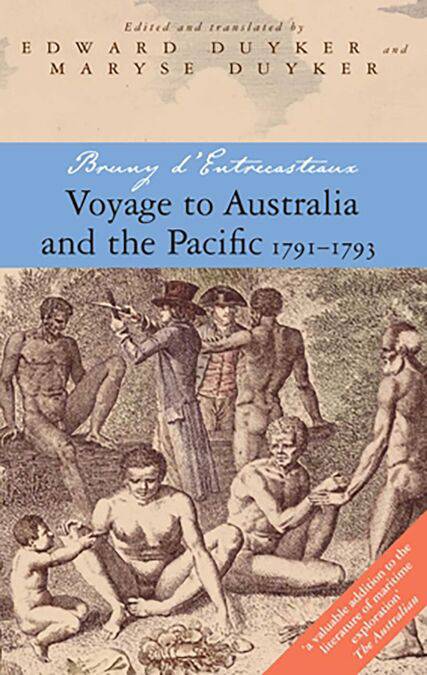
Bedankt voor het vertrouwen het afgelopen jaar! Om jou te bedanken bieden we GRATIS verzending (in België) aan op alles gedurende de hele maand januari.
- Afhalen na 1 uur in een winkel met voorraad
- In januari gratis thuislevering in België
- Ruim aanbod met 7 miljoen producten
Bedankt voor het vertrouwen het afgelopen jaar! Om jou te bedanken bieden we GRATIS verzending (in België) aan op alles gedurende de hele maand januari.
- Afhalen na 1 uur in een winkel met voorraad
- In januari gratis thuislevering in België
- Ruim aanbod met 7 miljoen producten
Zoeken
Omschrijving
In 1791 Admiral Bruny d'Entrecasteaux sailed with two ships from Revolutionary France to search for his compatriot, the explorer La Prouse, who was missing in the Pacific.
Over a period of nearly two years he had held his ideologically divided expedition together. Without his exceptional maritime skills his men (and one cross-dressing woman!) might all have died—or played out the destructive fury of the Revolution on the quarterdeck before reaching Java.
More than two centuries later, d'Entrecasteaux's account of his voyage remains a profound affirmation of his achievements. His humane, sensitive and even joyful encounters with the peoples of Australia and the Pacific make this a remarkably appealing book.
Although d'Entrecasteaux failed to discover the fate of La Prouse, and perished in the attempt, his voyage was more than a mere rescue mission.
Between 1791 and 1793 the expedition discovered the Derwent estuary and the D'Entrecasteaux Channel between Bruny Island and mainland Tasmania, and Esperance Bay and the Archipelago of the Recherche in Western Australia.
D'Entrecasteaux's voyage also recorded some of the earliest observations of the Aboriginal people of Tasmania and south-western Australia, and detailed accounts of the islands and peoples of the Pacific, including New Zealand, Tonga, New Caledonia, the Solomon Islands and New Guinea.
D'Entrecasteaux died suddenly off the coast of New Guinea, reportedly afflicted by symptoms of scurvy in July 1793.
Over a period of nearly two years he had held his ideologically divided expedition together. Without his exceptional maritime skills his men (and one cross-dressing woman!) might all have died—or played out the destructive fury of the Revolution on the quarterdeck before reaching Java.
More than two centuries later, d'Entrecasteaux's account of his voyage remains a profound affirmation of his achievements. His humane, sensitive and even joyful encounters with the peoples of Australia and the Pacific make this a remarkably appealing book.
Although d'Entrecasteaux failed to discover the fate of La Prouse, and perished in the attempt, his voyage was more than a mere rescue mission.
Between 1791 and 1793 the expedition discovered the Derwent estuary and the D'Entrecasteaux Channel between Bruny Island and mainland Tasmania, and Esperance Bay and the Archipelago of the Recherche in Western Australia.
D'Entrecasteaux's voyage also recorded some of the earliest observations of the Aboriginal people of Tasmania and south-western Australia, and detailed accounts of the islands and peoples of the Pacific, including New Zealand, Tonga, New Caledonia, the Solomon Islands and New Guinea.
D'Entrecasteaux died suddenly off the coast of New Guinea, reportedly afflicted by symptoms of scurvy in July 1793.
Specificaties
Betrokkenen
- Auteur(s):
- Vertaler(s):
- Uitgeverij:
Inhoud
- Aantal bladzijden:
- 456
- Taal:
- Engels
Eigenschappen
- Productcode (EAN):
- 9780522863857
- Verschijningsdatum:
- 30/05/2013
- Uitvoering:
- E-book
- Beveiligd met:
- Adobe DRM
- Formaat:
- ePub

Alleen bij Standaard Boekhandel
+ 18 punten op je klantenkaart van Standaard Boekhandel
Beoordelingen
We publiceren alleen reviews die voldoen aan de voorwaarden voor reviews. Bekijk onze voorwaarden voor reviews.









